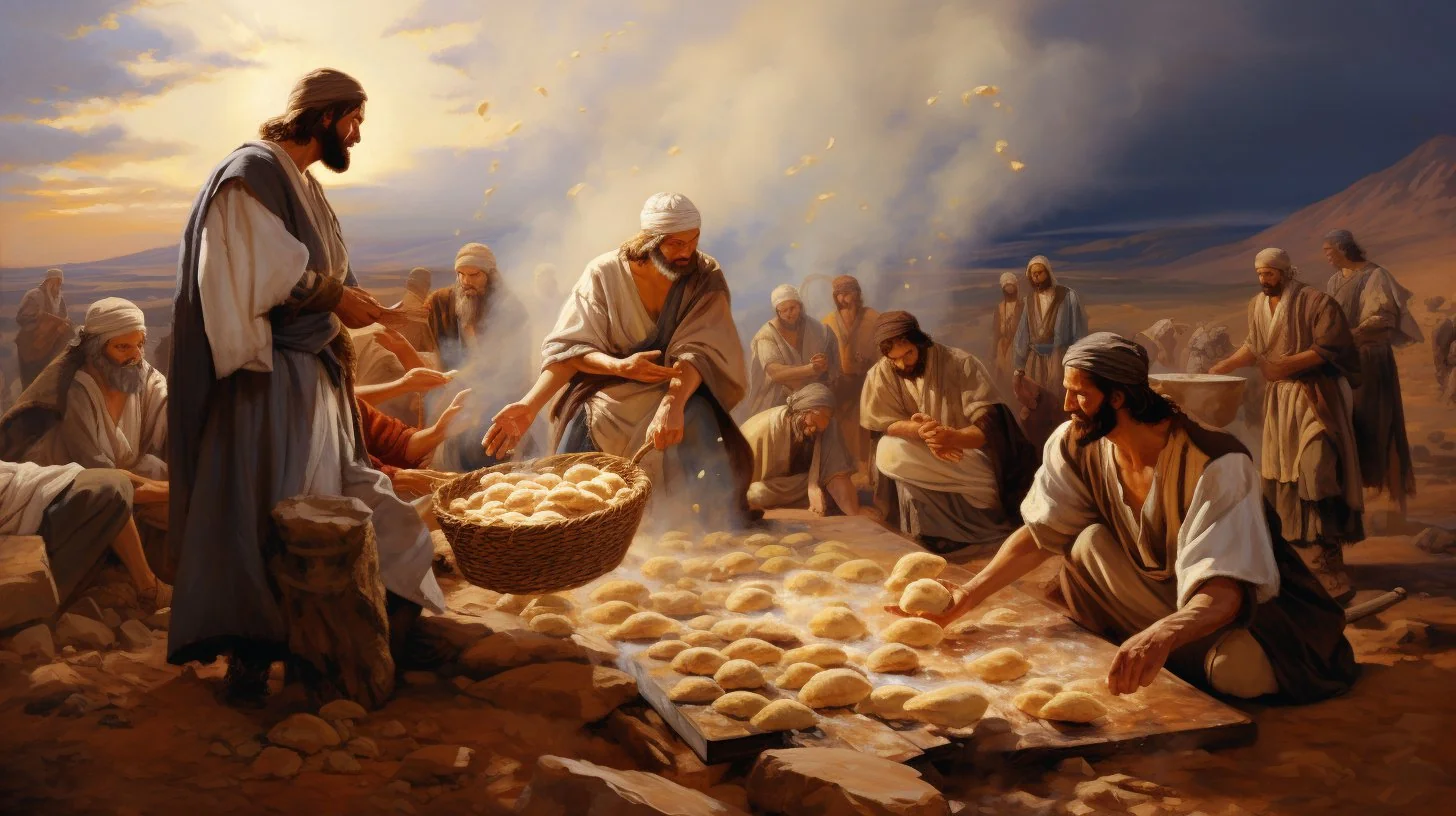
What Are the Biblical Miracles of Divine Nourishment

The Bible is replete with instances of divine intervention, showcasing God's power to sustain and nourish His people. Among these instances, the biblical miracles of divine nourishment stand out, captivating readers with stories of supernatural food provision. These miracles not only demonstrate God's compassion but also highlight His sovereignty and the depths of His relationship with humanity.
One of the most celebrated examples is the provision of manna, a mysterious substance that fed the Israelites during their wandering in the wilderness. Understanding these miraculous events offers profound insights into the theological implications of sustenance in the biblical narrative, reinforcing the belief that God is both the provider and sustainer of life. This article will delve into the rich tapestry of biblical miracles revolving around nourishment, focusing on their historical context, significance, and contemporary relevance.
- Definition of Biblical Miracles
- The Historical Context of Divine Nourishment
- Examples of Miraculous Food in the Bible
- The Significance of Manna: Facts and Symbolism
- Other Instances of Divine Nourishment
- Theological Implications of Miracles
- Modern Interpretations and Relevance
- Conclusion: Lessons from the Biblical Miracles
Definition of Biblical Miracles
Biblical miracles are extraordinary events that defy natural laws, attributed to the divine authority of God. These acts serve as signs of God's presence and ability to intervene in the world. Miracles within the Scriptures often occur in contexts of need or crisis, showcasing God’s responsiveness to human suffering and His desire to provide for His people.
In the realm of nourishment, these miracles reflect a deeper spiritual truth: God’s assurance that He will care for those who trust in Him. They embody the eternal provision that goes beyond mere physical sustenance, drawing believers into a reliance on divine grace.
The Historical Context of Divine Nourishment
The biblical narrative unfolds against a backdrop of harsh realities—hunger, drought, and despair. This context illustrates the critical need for divine nourishment. The Israelites, for example, faced starvation during their exodus from Egypt, a situation that necessitated God's miraculous provision. Such circumstances highlight the gravity of divine nourishment not only as sustenance but as an expression of God's covenant faithfulness.
Throughout history, food has played a vital role in the culture and tradition of the Israelites, encapsulating themes of survival, celebration, and community. During times of need, God intervened miraculously, demonstrating His authoritative power over nature and His unyielding love for His creation.
Examples of Miraculous Food in the Bible
Manna from Heaven
One of the most well-known examples of divine nourishment is the event of manna, described in Exodus 16. As the Israelites journeyed through the wilderness, they faced hunger and lamented their situation. In response, God provided them with manna, a miraculous bread-like substance that appeared each morning. This phenomenon not only met their physical needs but also served as a test of faith, as they were instructed to collect only what they needed for the day, trusting in God's daily provision.
Elijah and the Widow at Zarephath
Another significant miracle appears in 1 Kings 17, where the prophet Elijah encounters a widow during a severe drought. As she prepares to make one last meal for herself and her son, Elijah asks her to first make a cake for him. The widow responds with despair, having only enough flour and oil for a single meal. Incredibly, the flour and oil miraculously do not run out, providing sustenance for Elijah, the widow, and her son throughout the famine. This event emphasizes the theme of divine nourishment through faith and obedience.
The Feeding of the Five Thousand
In the New Testament, Jesus performed a remarkable miracle of divine nourishment by feeding a multitude of 5,000 men, not counting women and children, with just five loaves of bread and two fish (John 6:1-14). This miracle highlights Jesus’ compassion for the people, demonstrating that He is not only concerned with their spiritual needs but also their physical well-being. The leftovers that filled twelve baskets after the meal further illustrated God's abundant provision.
The Significance of Manna: Facts and Symbolism
Manna holds tremendous significance in biblical literature, symbolizing God's sustenance and grace. It is often interpreted as a precursor to the spiritual nourishment found in Christ. Jesus refers to Himself as the "bread of life" (John 6:35), drawing parallels between the heavenly bread provided to the Israelites and His own role as the ultimate sustainer.
Additionally, the account of manna encapsulates themes of dependence and trust in God. The Israelites had to rely on God's daily provision, a principle that echoes throughout the Scriptures. This teaches believers the importance of seeking God's guidance and relying on His sustenance in their daily lives.
Other Instances of Divine Nourishment
Outside of the well-known examples of manna and the feeding of the five thousand, there are other instances of divine nourishment that underscore God's role as provider. For example, in 2 Kings 4, the prophet Elisha performs a miracle by multiplying a widow's small amount of oil to pay her debts. This act not only salvages her situation but demonstrates God's power to provide abundantly even from seemingly insignificant resources.
In the New Testament, Jesus transforms water into wine at the wedding in Cana (John 2:1-11), a miracle that highlights God's generosity and His desire for joy in the lives of His people. These miracles are reminders that divine nourishment can come in myriad forms, often manifesting in surprising and unexpected ways.
Theological Implications of Miracles
The theological implications of biblical miracles of divine nourishment are profound. They reveal God's character as compassionate, faithful, and intimately involved in the lives of His people. These miracles serve not merely as historical accounts but as teachable moments that inform our understanding of God's provision.
At their core, these miraculous events challenge believers to trust in God's ability to meet their needs. They invite individuals to celebrate God's active presence in their lives, fostering a deep sense of gratitude and reliance on His goodness. This understanding leads to a transformative relationship with God, as faith is cultivated through the recognition of His ongoing provision.
Modern Interpretations and Relevance
In contemporary society, the lessons gleaned from biblical miracles of divine nourishment resonate with enduring relevance. In an age where self-sufficiency is often emphasized, these stories remind believers of the importance of community, generosity, and reliance on God. They challenge individuals to acknowledge their dependence on divine provision, particularly in challenging or uncertain times.
Manna and other miracles of nourishment invite reflection on how one can be a vessel of God's love and provision in a world grappling with food insecurity and injustice. Believers are called to share their resources and serve others, embodying the spirit of divine nourishment in their daily lives.
Conclusion: Lessons from the Biblical Miracles
The biblical miracles of divine nourishment serve as powerful reminders of God's faithfulness and provision. Through the examples of manna, Elijah's experience with the widow, and Jesus' miraculous feedings, believers gain insight into God's abundant grace and willingness to meet His people's needs.
As we reflect on these events, it becomes essential to embrace the lessons of dependence, trust, and generosity in our own lives. The call to serve others and share our blessings resonates deeply in a world that often feels fragmented and uncertain. Ultimately, the miracles of divine nourishment inspire faith and the belief that God continues to provide for His people, inviting us to partake in His abundance and share that gift with the world.
Did you find this article helpful? What Are the Biblical Miracles of Divine Nourishment See more here Education.
Leave a Reply






Related posts